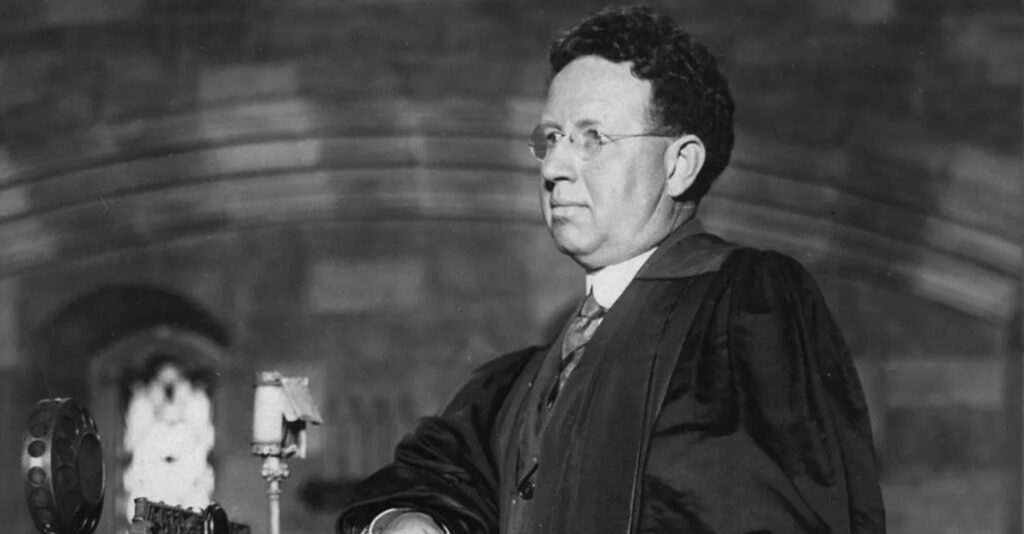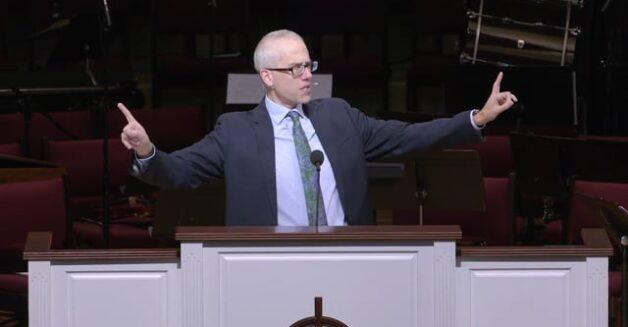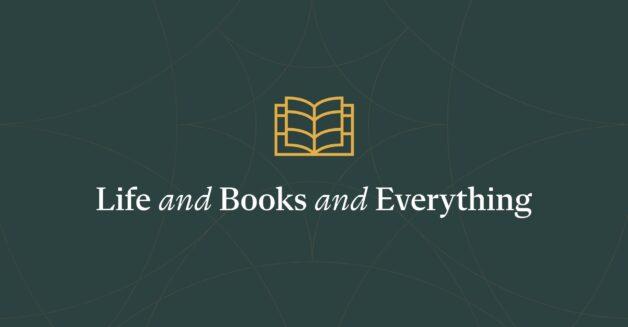
On May 21, 1922, Harry Emerson Fosdick took to the pulpit of Old First—the historic First Presbyterian Church (est. 1716) located on Fifth Avenue in Manhattan—to deliver what would be his most famous sermon. The American church broadly, and the Presbyterian church specifically, were already divided into conservative and liberal camps. Fosdick’s sermon did not create this theological and ecclesiastical division. But his sermon that spring clearly exposed the division, and, more than that, it exemplified all the reasons for it. For as much as Fosdick thought of himself as irenic, moderate, and peace-loving, one does not entitle a sermon “Shall the Fundamentalists Win?” without meaning to pick a fight.[1]
A Sermon for the Times
The text for Fosdick’s sermon that morning came from Acts 5:38-39 where the esteemed Gamaliel, a leader of the Jewish Sanhedrin, counsels an angry mob to leave the apostles alone, for if their “work be of men, it will come to nought: but if it be of God, ye cannot overthrow it.” Whether Fosdick fancied himself Gamaliel or not, he considered the Pharisee’s words from the first century to be a model for the twentieth century. What the church needed more than ever was a spirit of liberality and tolerance. In particular, this meant a spirit of charity toward the “multitudes of reverent Christians who have been unable to keep this new knowledge [about science, history, and religion] in one compartment of their minds and the Christian faith in another.” In affirming the aphorism “cantankerousness is worse than heterodoxy,” Fosdick argued that “the worst kind of church that can be offered to the allegiance of the new generation is an intolerant church.”
At the heart of the sermon was an indictment of fundamentalists and their fundamentals. Ostensibly, Fosdick was simply making the case that no one has “a right to deny the Christian name to those who differ” on the disputed points of Fundamentalism, but it was also obvious that Fosdick looked on fundamentalist doctrines with incredulity. Fosdick questioned the historicity of miracles and the Virgin Birth, he denied the inerrancy of the Scriptures and the atonement as a propitiatory sacrifice, and he did not accept the second coming of Christ as a literal event to be looked for in the clouds.
Key to Fosdick’s theological hermeneutic was his conviction that religion was an evolutionary development, and that religious belief should evolve as well. Just as people in previous generations had to learn that the earth revolves around the sun, so our generation must find a way for “the new knowledge and the old faith” to be “blended in a new combination.” In Fosdick’s estimation, educated people were turned off by the staid doctrines of the past and were starting to look for religious answers outside the church. If the church did not offer new ideas for a new day, it would suffer embarrassment and sink into irrelevance.
In the sermon’s stirring conclusion, Fosdick stated adamantly, “I do not believe for a moment that the Fundamentalists are going to succeed.” Love would triumph over intolerance; that’s what mattered. “There are many opinions in the field of modern controversy,” Fosdick observed, “concerning which I am not sure whether they are right or wrong, but there is one thing I am sure of: courtesy and kindliness and tolerance and humility and fairness are right. Opinions may be mistaken; love never is.” That last sentence perfectly captures the spirit of Fosdick’s sermon and the spirit of the liberalism he did so much to promote. For Fosdick, it was a “penitent shame that the Christian church should be quarreling over little matters when the world is dying of great needs.” The fundamentalists were insisting on dubious theological theories and waging war for doctrinal idiosyncrasies when, in Fosdick’s words, “So much of it does not matter!” In Fosdick’s mind, there was “not a single thing at stake in the controversy on which depends the salvation of human souls.” The need of the hour was not theological wrangling, but laboring so “that men in their personal lives and in their social relationships should know Jesus Christ.” In short, Fosdick’s vision for the church was the expansive charity of liberalism instead of the cramped rigidity of fundamentalism. “God keep us,” he exhorted in the last line of his sermon, “intellectually hospitable, open-minded, liberty-loving, fair, tolerant, not with the tolerance of indifference as though we did not care about the faith, but because always our major emphasis is upon the weightier matters of the law.”
A Heretic for his Generation
Harry Emerson Fosdick was born in 1878 in Buffalo, New York into a family that Fosdick later described as both “deeply Christian” and possessing “a strong tradition of noncomformity.”[2] Although he readily embraced his parents’ faith—by contagion rather than coercion, he recalled—religion became the main source of his unhappiness as a child. In his autobiography, Fosdick reflected (sounding more like an adult than a child) that “some of the most wretched hours of my boyhood were caused by the pettiness and obscurantism, the miserable legalism and terrifying appeals to fear that were associated with the religion of the churches.”[3] As a sensitive boy, deeply religious and morbidly introspective, Fosdick recalled “weeping at night for fear of going to hell.” He agonized that he had committed the unpardonable sin and that he would suffer forever in the horrors described in the book of Revelation.[4] It is not hard to see how the young Fosdick (or at least as he remembered himself) would grow into the adult Fosdick: an earnest man committed to the uplifting power of religion, with an equal commitment to ridding religion of antiquated and unhelpful elements from the past.
In 1900, Fosdick graduated from Colgate University where his thinking was profoundly shaped by the liberal Baptist theologian William Newton Clarke (1841-1912). At Colgate, Fosdick became a firm believer in evolution and a skeptic toward orthodox Christianity. When he first felt a call to ministry in college, most of his classmates were surprised. By his own admission, as a college student, he was a better dancer than theologian.[5] In fact, so eviscerated was his faith, Fosdick wondered whether any church would want him for a pastor:
I was through with orthodox dogma. I had not the faintest interest in any sect or denomination. I could not have told clearly what I believed about any major Christian doctrine. I did not see how any denomination could ever accept me as its minister. But I did not care. I wanted to make a contribution to the spiritual life of my generation.[6]
In time, however, crowds would clamor for Fosdick the minister. After graduating with a Bachelor of Divinity from Union Theological Seminary in New York City in 1904, Fosdick was ordained to the Baptist ministry and took the pulpit of First Baptist Church in Montclair, New Jersey. After pastoring in Montclair for more than a decade, Fosdick crossed the Hudson and served in three different churches in New York City: First Presbyterian Church (1918-25), Park Avenue Baptist Church (1925-30), and Riverside Church (1930-1946), the interdenominational church whose 2500-seat gothic cathedral was conceived and financed by John D. Rockefeller, Jr. with the intention that Fosdick would be the senior pastor. Fosdick also taught homiletics at Union Theological Seminary from 1915 to 1946.
By all accounts, Fosdick was one of the most prominent preachers of the twentieth century. He wrote forty-seven books, numerous articles, and the well-known hymn “God of Grace and God of Glory.”[7] Martin Luther King, Jr., called Fosdick the greatest preacher of the century. Labeled as “modernism’s Moses,” Fosdick was a spiritual inspiration to some and a singular instance of spiritual declension to others. When Ivy Lee, a leading advertising executive and a member of Fosdick’s church, saw to it that “Shall the Fundamentalists Win?” was sent to every ordained Protestant minister in the country and that the sermon was reprinted in numerous liberal periodicals, there was bound to be a quick and vociferous response. For orthodox Presbyterians, Fosdick was everything they had feared and everything that was wrong with their denomination.
In Fosdick’s telling, “Shall the Fundamentalists Win?” was a plea for tolerance, a good faith petition for the church “to take in both liberals and conservatives without either trying to drive the other out.”[8] And yet, even Robert Moats Miller, Fosdick’s sympathetic biographer, acknowledges that “Fosdick was kidding himself” by characterizing the sermon in this way. “What were conservative Presbyterians to think when this Baptist declared himself from a Presbyterian pulpit belief in the virgin birth nonessential, the inerrancy of the Scriptures incredible, the second coming of Christ from the skies an outmoded phrasing of hope?”[9] Mired in denominational controversy and feeling the sting of criticism, Fosdick resigned his pastorate at Old Church in 1924. “They call me a heretic,” Fosdick said in his farewell sermon. “Well, I am a heretic if conventional orthodoxy is the standard. I should be ashamed to live in this generation and not be a heretic.”[10]
A Champion for True Liberalism
The purpose of this article is not to evaluate Fosdick’s ministry. Judged by historic Christian orthodoxy, let alone by the confessions of the Presbyterian church, Fosdick is a cautionary tale in how to end up on the wrong side of Machen’s “Christianity and Liberalism” divide. Judged by the internal logic of liberalism, Fosdick is a successful example—outdated though it may be—of how one man reached out to an unbelieving world with a message of Christian spirituality to those who might not have otherwise listened. “The idea of liberal theology,” writes Gary Dorrien, a professor at Fosdick’s alma mater, Union Theological Seminary, is the 300-year-old idea “that Christian theology can be genuinely Christian without being based upon external authority.” Liberalism is the belief that “religion should be modern and progressive from the standpoint of modern knowledge and experience.” It is the conviction that one can be a faithful Christian without believing in hell or in a universal flood, without believing that God commanded the extermination of the Canaanites, and without believing that God “demanded the literal sacrifice of his Son as a substitutionary legal payment for sin.”[11]
In all of this, Fosdick was one of liberalism’s most eloquent and effective spokesmen of the last century. Fosdick was not as radical as some of his followers would have liked. He was not a revolutionary. He valued the church or believed in the transforming power of Christianity (as he understood it). Like most mainliner Protestants of his age, Fosdick was anticommunist and an unapologetic supporter of democracy.[12] Later in life, under the influence of Swiss theologian Karl Barth, Fosdick insisted that the church had to go beyond modernism and that the world needed to rediscover the doctrine of sin. He was an “evangelical liberal” in that he took the Bible seriously—believed it contained old truths that needed to be expressed in new language—and wanted people to have a relationship with Jesus.[13]
And yet, even if Fosdick had an evangelical impulse to win the hearts of the masses, in any true theological sense of the word, he was a liberal. Indeed, Fosdick openly and unabashedly described himself as a liberal. And rightly so. When Fosdick preached about salvation from sin there was no clear doctrine of Christ’s atonement, no mention of divine wrath, only a vague sentiment that Jesus “came to save men from that inner wrongness that curses human life.”[14] Just as important, Fosdick did not believe in the divinity of Christ in any meaningful sense. “Wherever goodness, beauty, truth, love are—there is the divine,” Fosdick preached in a 1933 sermon. We can call Jesus divine if we mean “the divinity of his spiritual life,” but Jesus’s divinity differs from ours only in degree, not in kind.[15] In explicitly rejecting the Chalcedonian Definition—that Christ is the second person of the Trinity, eternal God, of one substance and equal with the Father, who took upon himself a human nature, so that the two distinct natures were inseparably joined together in one person—Fosdick argued that the historic church had “garbled [Jesus] beyond all recognition.[16] When Fosdick calls himself a heretic, we should take him at his word.
According to Miller, Fosdick’s ministry can be summed up with a single line: “though astronomies change, the stars abide.”[17] This was Fosdick’s conviction throughout his pastoral career. In one of his later sermons, he described religion as akin to courtesy: an inward spirit that expresses itself in many forms.[18] Preaching from Joshua 7:6 about Joshua falling on his face before the ark, Fosdick argued that “arks pass away, but religion remains.”[19] For many Christians, Fosdick explains, their “ark” is a special doctrine or specific denomination, some bit of ritual, some miracle in history, a special theory of the atonement, a belief in fiat creation or the Virgin Birth. “Such things may have been very precious in your experience,” Fosdick allows, but we must not confuse keeping the faith with keeping the ark.[20] Christians are too easily separated by creeds and rituals, when we can find common ground in our prayers and hymns.[21] That was the essence of Fosdick’s message and the essence of twentieth-century liberal Christianity. “If, then, you ask what a true liberalism is, I should say that it is one that pays little attention to the arks that divide, but cares with all its heart about the religion that unites.”[22]
[1] Harry Emerson Fosdick, “Shall the Fundamentalists Win?” Christian Work 102 (June 10, 1922), 716-722.
[2] Harry Emerson Fosdick, The Living of These Days: An Autobiography (New York: Harper and Row, 1956), 15, 19.
[3] Fosdick, The Living of These Days, 33.
[4] Fosdick, The Living of These Days, 35-36.
[5] Fosdick, The Living of These Days, 57.
[6] Fosdick, The Living of These Days, 57.
[7] See Gary Scott Smith, “Fosdick, Harry Emerson (1878-1969)” in American Religious History: Belief and Society Through Time, Volume 2: Reconstruction to World War II, Ed. Gary Scott Smith (Santa Barbara, CA: ABC-CLIO, 2021), 145-47.
[8] Fosdick, Living of These Days, 145.
[9] Robert Moats Miller, Harry Emerson Fosdick: Preacher, Pastor, Prophet (New York: Oxford University Press, 1985), 116.
[10] Fosdick, Living of These Days, 176.
[11] Gary Dorrien, The Making of American Liberal Theology: Imagining Progressive Religion, 1805-1900 (Louisville, KY: Westminster John Knox Press, 2001).
[12] See, for example, Fosdick’s sermon “A Religion to Support Democracy” (1955) in Answers to Real Problems: Selected Sermons of Harry Emerson Fosdick, Ed. Mark E. Yurs (Eugene, OR: Wipf and Stock, 2008). “Democracy has done for us Christians an incalculable service, and now in her hour of need democracy asks us what we can do for her. What kind of religion ought ours to be if it is to support the democratic faith and practice?” (216).
[13] Mark Yurs calls Fosdick “an evangelical liberal” in his Introduction to Answers to Real Problems, viii.
[14] From Fosdick’s sermon “The Modern World’s Rediscovery of Sin” (1941) in Answers to Real Problems, 140.
[15] From Fosdick’s sermon “The Peril of Worshiping Jesus” (1933) in Answers to Real Problems, 32.
[16] Fosdick, “The Peril of Worshiping Jesus”, 33.
[17] Miller, Harry Emerson Fosdick, viii.
[18] From Fosdick’s sermon “Conservative and Liberal Temperaments in Religion” (1955) in Answers to Real Problems, 208.
[19] Fosdick, Answers to Real Problems, 208.
[20] Fosdick, Answers to Real Problems, 212.
[21]Fosdick, Answers to Real Problems, 214.
[22]Fosdick, Answers to Real Problems, 215.



